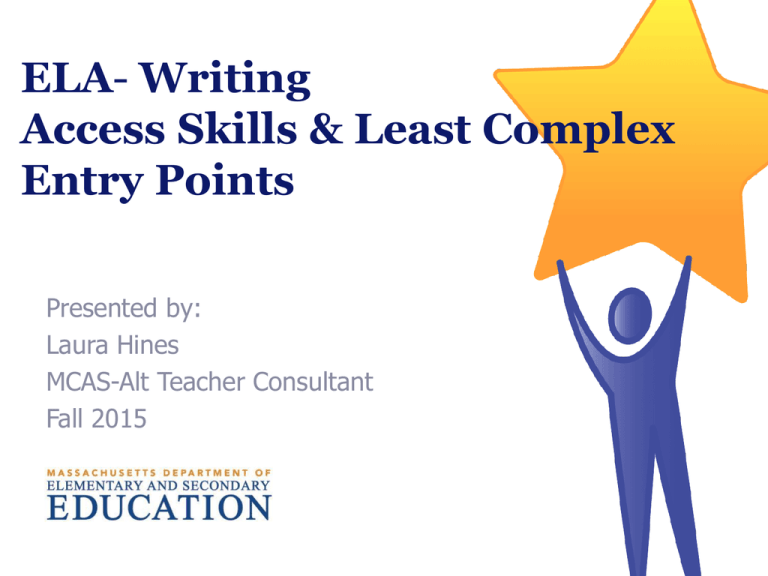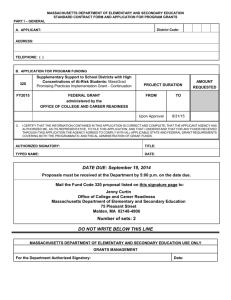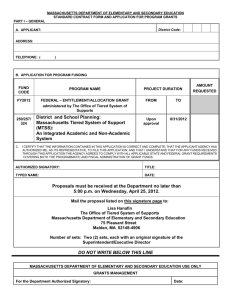MCAS Alternate Assessment (MCAS-Alt) Creating Portfolios that
advertisement

ELA- Writing Access Skills & Least Complex Entry Points Presented by: Laura Hines MCAS-Alt Teacher Consultant Fall 2015 ELA-Writing Develop expressive communication skills to create permanent products NOT the physical act of putting pen to paper or practicing keyboarding skills 2 Massachusetts Department of Elementary and Secondary Education Writing for communicating: Students at a pre-symbolic communication level will most likely create written products that reflect access skills (e.g., Choose from an array of errorless choices related to the creation of a written product) Students with emerging or established communication systems may create written products that reflect entry points (e.g., Express an opinion without deviating from a specific topic or text) Massachusetts Department of Elementary and Secondary Education 3 Educator Manual pp., 20-25 The text type selected informs which rubric is used to score the sample Opinion (grades 35)/Argument (grades 68 and 10): stating a claim, opinion, preference, or analysis based on a text or topic, citing reasons and evidence (from a text, where possible). Informative/Explanatory text: conveying or explaining facts, information, or ideas on a topic, including descriptions from a text. Narrative: telling a story based on real or imagined events from a text or personal experience; a narrative can be fiction, drama (script), a personal reflection, or an event sequence. Poetry: using figurative language (e.g., similes, metaphors), imagery, sounds of words (e.g., rhyme), meter, and/or repetition to express emotion or tell a story. Massachusetts Department of Elementary and Secondary Education 4 Writing Requirements: No data charts are required Students should use their primary mode of communication to produce work samples. Each final sample TYPE must include a draft or baseline sample Teachers will pre-score the 3 final samples only, using the state provided rubrics. (see handouts) Use entry points and access skills in “Text Types and Purposes” cluster (W.x.1, W.x.2, W.x.3, MA.W.x.3a) Massachusetts Department of Elementary and Secondary Education 5 Opinion: Work Description Label 6 Massachusetts Department of Elementary and Secondary Education Final: Opinion Sample 7 Massachusetts Department of Elementary and Secondary Education 8 Massachusetts Department of Elementary and Secondary Education Information/ Explanatory : Work Description Label 9 Massachusetts Department of Elementary and Secondary Education Informative/Explanatory 10 Massachusetts Department of Elementary and Secondary Education Supporting Documentation Add the AAC board 11 Massachusetts Department of Elementary and Secondary Education 12 Massachusetts Department of Elementary and Secondary Education Narrative: Work Description Label 13 Massachusetts Department of Elementary and Secondary Education Narrative: Final Sample 14 Massachusetts Department of Elementary and Secondary Education 15 Massachusetts Department of Elementary and Secondary Education Narrative: Work Description Label 16 Massachusetts Department of Elementary and Secondary Education Narrative: “We are Going to the Shelter” 17 Massachusetts Department of Elementary and Secondary Education 18 Massachusetts Department of Elementary and Secondary Education Teacher-Scribed Work Sample Includes the final written product with notation indicating the student’s participation and contribution in the creation of the sample Specifically describes the materials/context of the activity Indicates the student’s response (accuracy, independence) to each item/trial using his mode of communication Labeled with name, date, accuracy, independence, and other information as needed 19 Massachusetts Department of Elementary and Secondary Education Poetry 20 Massachusetts Department of Elementary and Secondary Education SEPTEMBER Written by Room 190 LINE 1: LEAVES FALL SOFTLY ON THE GROUND Material: Leaves – Does not release even with prompting LINE 2: SQUIRELS RUN AND PLAY Material: Fur Swatch – Releases 11 seconds independently LINE 3: ACORNS FALL Material: Acorns – Releases 10 seconds independently LINE 4: ACORNS ROLL Material: Acorns – Releases 14 seconds independently LINE 5: THE SQUIREL RUNS AWAY Material: Fur Swatch – Releases 11 seconds independently Accuracy: 80% Independence: 80% 21 Massachusetts Department of Elementary and Secondary Education 22 Massachusetts Department of Elementary and Secondary Education Educator’s Manual, pp. 22-25 Required Elements for Writing Baseline writing sample X X + (Not scored) Final writing sample (1 of 3) X 90 X + + 23 Massachusetts Department of Elementary and Secondary Education Thinking about Self-Evaluation Student choice-making and evaluation of one’s own work are essential components of the concept of self-determination, which is an important predictor of successful post school outcomes (Wehmeyer& Palmer, 2003; Wehmeyer & Schwartz, 1998). Kleinert,H.L. & Kearns, J.F. (2010). Alternate Assessment for students with Significant Cognitive Disabilities. Baltimore: Paul H. Brookes Publishing Co. Massachusetts Department of Elementary and Secondary Education 24 Students Making Choices Choices of materials, response format, order of events Choice of partner Choice of continuing or terminating the activity Do you see evidence of the “student’s voice” in the self-evaluation? Is it authentic? (Educator’s Manual, p. 37) 25 Massachusetts Department of Elementary and Secondary Education

